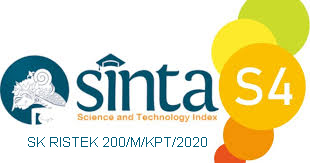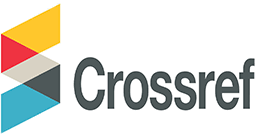Implementation of The Patas Model in The Development of The Matana University Graduation Information System
Abstract
There is an urgent need to make a graduation information system at Matana university. This system is needed, especially for students, secretariat, and finance. Several other things to consider, namely the number of participants and the graduation committee are more than 300 people, delegation of system development to one person, many users are still unfamiliar with integrated information systems based on information technology (IS/IT), the Corona pandemic, and can anticipate sudden changes. Therefore, we need a software development model that fits these conditions. The research methods for making this model, such as literature study, interviews, observation, model making and model testing (model application). This software development model is called Patas, it is fast and limited. This model has six stages, i.e., user needs, tools selection, modification, evaluation, implementation, and maintenance. This model is then applied to the development of a graduation information system at Matana University. The Matana University graduation information system has been successfully built using the Patas model. This system features prospective graduate registration, payment, sending information to participants (personal or mass) by email, dashboard, privilages user, attendance for graduates by barcode, change profile and content management. This graduation information system is used from graduation preparation to graduation day. Thus, the Patas model can be an alternative model in software development. In the future, the Patas model needs to be tested for the development of a different and larger system.
Keywords
Full Text:
PDFReferences
Barus, S. P. (2020). Design and Build a Seminar Management Information System to Manage 2019 Indonesian Qualitative Seminar & Workshop (SLKI). International Journal of Informatics and Computation, 2(1), 12. doi:10.35842/ijicom.v2i1.25
Inilah Wilayah PPKM di Jawa-Bali Periode 5 Hingga 18 Oktober 2021. (n.d.). Retrieved from https://setkab.go.id/inilah-wilayah-ppkm-di-jawa-bali-periode-5-hingga-18-oktober-2021/
Top 13 Software Development Models — Which is best? | Scopic. (2021, April 20). Retrieved from https://scopicsoftware.com/blog/top-software-development-models/
Budi, D. S., Siswa, T. A. Y., & Abijono, H. (2017). Analisis Pemilihan Penerapan Proyek Metodologi Pengembangan Rekayasa Perangkat Lunak. Teknika, 5(1), 24–31. doi:10.34148/teknika.v5i1.48
Barus, S. P., & Pangruruk, F. A. (2021). Penerapan Kerangka Kerja Scrum Pada Rancang Bangun Sistem Informasi Pelaporan Hasil Questioner Dosen Universitas Matana. Ikraith-informatika, 5(1), 68–73.
Arizal & Annisa Nurul Puteri. (2020). Sistem Informasi Manajemen Wisuda Berbasis Website Menggunakan Metode Waterfall. Jurnal Sistem dan Informatika (JSI), 14(2), 125–134. doi:10.30864/jsi.v14i2.309
Sihotang, A. W. Y., & Wagiu, E. B. (2020). Perancangan Sistem Informasi Calon Wisudawan Universitas Advent Indonesia. TeIKa, 10(2), 125–133. doi:10.36342/teika.v10i2.2382
Anggoro, D., Sakti, D. V. S. Y., & Waluyo, S. (2021). Implementasi Sistem Informasi Berbasis QR Code Guna Mencegah Kerumunan dalam Antrian Wisuda. Edumatic: Jurnal Pendidikan Informatika, 5(1), 128–136. doi:10.29408/edumatic.v5i1.3383
Zhu, H., Xie, Y., Hou, M., Yan, K., Li, J., & Li, T. (2018). Research on a Digital Graduation Management System Based on the Internet. Procedia Computer Science, 131, 855–859. doi:10.1016/j.procs.2018.04.283
BAKTI - 6 Jenis Bahasa Pemrograman Terpopuler di Indonesia. (2019, October 11). Retrieved from https://www.baktikominfo.id/id/informasi/pengetahuan/6_jenis_bahasa_pemrograman_terpopuler_di_indonesia-1036
Bahasa Pemrograman yang Populer di Indonesia Tahun 2020. (2021, January 20). Retrieved from https://suhu.co.id/berita/bahasa-pemrograman-yang-populer-di-indonesia-tahun-2020
Devadiga, N. (2018). A Case Study on Identifying Software Development Lifecycle and Process Framework. International Journal of Advanced Engineering Research and Science, 5(7), 143–147. doi:10.22161/ijaers.5.7.21
GitHub - PHPMailer/PHPMailer: The classic email sending library for PHP. (n.d.). Retrieved from https://github.com/PHPMailer/PHPMailer
PHP QR Code. (n.d.). Retrieved from https://sourceforge.net/projects/phpqrcode/
Abdulloh, R. (2016). Trik Mudah Membuat CMS Website dari Nol. Jakarta: Elex Media Komputindo.
jQuery. (n.d.). Retrieved from https://jquery.com/
Bootstrap. (n.d.). Retrieved from https://getbootstrap.com/
DOI: https://doi.org/10.31326/jisa.v5i2.1327
Refbacks
- There are currently no refbacks.
Copyright (c) 2022 Simon Prananta Barus

This work is licensed under a Creative Commons Attribution-ShareAlike 4.0 International License.
JOURNAL IDENTITY
Journal Name: JISA (Jurnal Informatika dan Sains)
e-ISSN: 2614-8404, p-ISSN: 2776-3234
Publisher: Program Studi Teknik Informatika Universitas Trilogi
Publication Schedule: June and December
Language: English
APC: The Journal Charges Fees for Publishing
Indexing: EBSCO , DOAJ, Google Scholar, Arsip Relawan Jurnal Indonesia, Directory of Research Journals Indexing, Index Copernicus International, PKP Index, Science and Technology Index (SINTA, S4) , Garuda Index
OAI address: http://trilogi.ac.id/journal/ks/index.php/JISA/oai
Contact: jisa@trilogi.ac.id
Sponsored by: DOI – Digital Object Identifier Crossref, Universitas Trilogi
In Collaboration With: Indonesian Artificial Intelligent Ecosystem(IAIE), Relawan Jurnal Indonesia, Jurnal Teknologi dan Sistem Komputer (JTSiskom)
JISA (Jurnal Informatika dan Sains) is Published by Program Studi Teknik Informatika, Universitas Trilogi under Creative Commons Attribution-ShareAlike 4.0 International License.


















